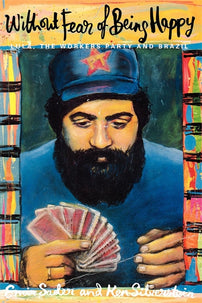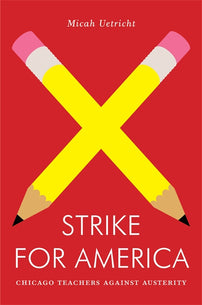Victory for the Education Sector Strike in Brazil
An examination of the recent strike by Brazilian education workers in opposition to proposed pension reform.

First published at Progress in Political Economy.
It might be too early, to speak of the year 2018 as the year of global education struggles. However, in this blog post co-written with Joeferson Almeida we highlight that while (wildcat) strikes in the US have spread from one state to another, staff in the education sector meanwhile in Portugal, England and Brazil have also all been on strike. In Brazil, several federal states saw the successful attempts to fightback the local version of a previously nationally planned pension reform. In São Paulo, the strike lasted from the 8th to the 27th March and was outstanding in referring to female self-empowerment, democratisation, and class struggle.
#Sampaprev — Attempts to Privatise the Public Pension Sector
Currently, the workers in the education sector who encompass more than 80% of the communal workforce in São Paulo pay 11% of their monthly income for the pension system. The head of the council João Doria planned to create a second pension institute, paid by a higher share of the wages (between 14% and 19%). The new institute would be allowed to be listed at the stock market, turning a part of the pensions of public servants into assets of speculation, using the monthly income of the public employees as risk insurance. This does not only affect the public staff still in service, but also the already retired workers, who would have been forced to pay 5% of their pension to the new institute.
This attack, however, was not unexpected and comes along the line of a wave of austerity measures in the recent years. The unelected neoliberal government of Michel Temer has tried to implement a similar system on a national level. Already pushing through a bitter labour reform last year in 2017, the pension reform has been another attempt to deliver public goods for big business. Due to the pressure of trade unions and social movements for more than a year and a national wide protest day on the 19th February, the plans for the national pension reform had to be halted. Instead, "Sampaprev," the local pension reform of the biggest Brazilian city, São Paulo, should serve as a pilot project.
Workers Pushing for Strike Democracy, Female Self-empowerment and Class Struggle
Currently, Brazil is marked by a tremendous economic and political polarization reflected in increasing struggles and a political crisis of the elites. While femicides and attacks on black and young workers have been increasing in the last years, inspiring mass movements against social cuts, sexual violence, and police oppression dominate the political landscape. This was also reflected in the recent strike. More than 80% of the workers in the education sector are women, most of them are black and/or work in schools of poor and mainly black communities. It was no coincidence that the strike started on the 8th of March, International Women’s Day. The first demonstration saw about 10.000 participants join the protest act of the women’s movement of São Paulo.
During the 20 days of strike, more and more women took the lead. Every morning, the public employees went to their schools, to discuss their strategies and involve parents and students in their debates. Out of these nuclear reunions ideas for new strike actions, such as blockades and local demonstrations, were born. Despite a strong opposition from a left minority inside the union leadership, the majority refused to support these grassroot activities with material. Thus, other trade union structures of national and regional federations helped with leaflets, banners, and other material and hence supported the local employees to break the grip their leadership had on the strike dynamic.
While the education sector has been on strike every year since 2012 to defend good education, their wages, and labour rights, 2018 saw a new quality of struggle. Next to the growing self-esteem of female employees, it was the parents who solidarized with the strike that brought in a new consciousness of class rhetoric, understanding the struggle of the public sector as part of their own, and the attacks of the ruling class as part of a wider capitalist project.
The democratization of the strike, the feminization of the leadership, and the growing understanding of the class character also strengthen the movement. While in the past years about 5,000 people took regularly part in the central strike demonstrations, the current strike saw nearly every day between 20.000 and on its peak 40.000 workers in the street.
Police Repression, Marielle Franco, and Council Meeting Under Siege
On the 14th of March the local Constitution and Justice Commission of São Paulo spontaneously declared the Sampaprev pension reform as legal. This had been the first step to implement the reform and was understood as preparation for an all chambers vote. Attempting to occupy the council, thousands of education sector workers flocked into the street, only some dozens managed to enter the chamber. Doria’s response was violent police repression. The police used tear gas, gas bombs, pepper spray, and rubber bullets to attack the protest. During the clashes, a female teacher broke her nose and many others were wounded. The pictures of bleeding women were spread on several social media platforms. In that same night Marielle Franco, a black female LGBTQ activist and councillor for the Party for Liberty and Socialism (PSOL) was assassinated in Rio de Janeiro leaving the broader left and social movement activists in a state of shock. Marielle’s activism encompassed to openly demand an end of police militias and violence, the fight for black and LGBTQ rights, the women’s movement, and the acceptance of Afro-Brazilian culture.
The striking education sector in São Paulo drew a clear link between the state violence against, in the majority, striking women and the assassination of Marielle, a black female activist by bullets that belonged to a police weapon. On the next day over 100.000 people demonstrated alone in São Paulo against police repression, state racism, and sexual violence. This protest was broadly supported by the striking education sector. The events politicized the strike even more. On every demonstration, the teachers and council workers spoke about Marielle, her legacy for the struggle and the link to capitalist oppression, profit interests, and state violence. A broader part of left forces gained more and more influence in the strike, warning that if Doria would try to push Sampaprev through, the answer will be a general strike of São Paulo. Against the interests of the majority in the trade union leadership the bulk of striking activists cheered for this proposal. And although, no general strike had been called, the education sector was able to link with other parts of the public sector which would have been also impacted by the local pension reform. Finally, nurses, doctors, social workers, and others went on strike too, to support the struggle.
On 27th of March, about 40.000 people blocked the council chamber. The council had been "under siege" since the beginning of the strike as dozens of teachers have been sleeping in tents in front of the entrance and hundreds of posters and banners have been hung all around the building. On this day, however, the council meeting was retarded from the morning to noon, to the evening and it became clear that Doria lost his majority for the project. The decision on Sampaprev has been postponed for 120 days. As the pressure on local councillors is very strong, regarding the local and general elections this year, there is a high possibility that Sampaprev will never be decided at all.
Winning the strike, the education sector of São Paulo not just saved its pensions, the pensions of all council employees and the ones of already retired workers, but also strengthened the fight against austerity measures and further attacks on the pension system in other federal states in Brazil as they refused to serve as a pilot project. They also showed that a strike can be democratized, increase female self-empowerment, and class rhetoric and along that way, the struggle could turn into a victory.
Anne Engelhardt is a PhD candidate at the University Kassel in Germany and writes about labour disputes in ports and airports (choke points of economy) in Brazil and Portugal.
Joeferson Almeida is a history teacher in São Paulo; trade union council member of SINPEEM (Sindicato dos Profissionais em Educação no Ensino Municipal de São Paulo).
[book-strip index="1" style="display"]




